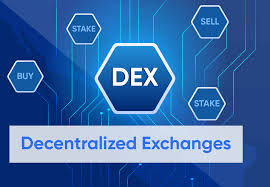
Decentralized Exchanges: Empowering Users in the Crypto Revolution
This article all about centralized exchanges in cryptocurrency, including popular ones and a discussion about liquidity, governance and risks
INTRODUCTION TO CRYPTO
CryptoTokin
4 min read


Introduction: Decentralized exchanges (DEXs) represent a revolutionary evolution in the cryptocurrency ecosystem, offering users greater control, security, and transparency in trading digital assets. Unlike their centralized counterparts, which rely on intermediaries to facilitate transactions, DEXs operate on decentralized networks, enabling peer-to-peer trading without the need for intermediaries. In this comprehensive guide, we will explore the world of decentralized exchanges, including popular platforms, their usage, governance models, liquidity, and why they are crucial in the crypto landscape.
Understanding Decentralized Exchanges: Decentralized exchanges (DEXs) are platforms that allow users to trade cryptocurrencies directly with one another without relying on centralized intermediaries such as exchanges or brokers. These exchanges operate on decentralized networks, utilizing smart contracts and blockchain technology to enable peer-to-peer trading in a trustless and permissionless manner. DEXs aim to democratize access to financial markets, promote financial sovereignty, and eliminate the risks associated with centralized intermediaries, such as hacking, censorship, and custodial control of funds.
Popular Decentralized Exchanges: Several decentralized exchanges have emerged as prominent players in the crypto space, offering diverse features, liquidity pools, and trading pairs to cater to the needs of users. Some popular decentralized exchanges include:
Uniswap: Uniswap is a decentralized exchange built on the Ethereum blockchain, known for its automated market-making (AMM) mechanism and user-friendly interface. Uniswap enables users to swap ERC-20 tokens directly from their wallets without the need for order books or centralized intermediaries.
SushiSwap: SushiSwap is a decentralized exchange forked from Uniswap, offering additional features such as yield farming, staking, and community governance through its native token, SUSHI. SushiSwap aims to incentivize liquidity providers and reward users for participating in the platform's ecosystem.
PancakeSwap: PancakeSwap is a decentralized exchange built on the Binance Smart Chain (BSC), offering low fees and fast transaction speeds compared to Ethereum-based DEXs. PancakeSwap features automated market-making (AMM) and yield farming, allowing users to earn rewards by providing liquidity to liquidity pools.
Curve Finance: Curve Finance is a decentralized exchange optimized for stablecoin trading, offering low slippage and minimal fees for exchanging stablecoins such as USDC, DAI, and USDT. Curve Finance utilizes a bonding curve algorithm to maintain stable prices and efficient liquidity provision.
Balancer: Balancer is a decentralized exchange and automated portfolio manager that enables users to create custom liquidity pools with multiple tokens and weightings. Balancer offers flexible liquidity provision and automated rebalancing mechanisms, allowing users to earn fees and incentives by providing liquidity.
How Decentralized Exchanges Work: Decentralized exchanges operate using smart contracts, which are self-executing contracts with the terms of the agreement directly written into code. These smart contracts facilitate the exchange of cryptocurrencies between users without the need for intermediaries or centralized control. The process of trading on a decentralized exchange typically involves the following steps:
Asset Selection: Users select the desired cryptocurrency pairs they wish to trade on the decentralized exchange.
Wallet Connection: Users connect their cryptocurrency wallets to the decentralized exchange using a compatible wallet interface such as MetaMask or Trust Wallet.
Order Placement: Users specify the amount and price of the cryptocurrency they wish to buy or sell, creating a trading order on the decentralized exchange.
Smart Contract Execution: The decentralized exchange matches trading orders using smart contracts and executes trades directly between users' wallets.
Transaction Confirmation: Once the trade is executed, users receive confirmation of the transaction on the blockchain, reflecting the updated balances in their wallets.
Governance in Decentralized Exchanges: Decentralized exchanges often implement governance mechanisms to enable users to participate in decision-making processes and shape the future direction of the platform. Governance in decentralized exchanges typically involves the following components:
Token Voting: Users hold governance tokens that entitle them to vote on proposals and decisions related to the decentralized exchange's operations, protocols, and fee structures.
Proposal Submission: Users can submit proposals for changes, upgrades, or new features to the decentralized exchange's governance system for consideration by the community.
Voting Process: Governance token holders vote on proposed changes or decisions through on-chain voting mechanisms, with each token representing one vote. Proposals must meet a certain threshold of support to be approved and implemented.
Implementation: Once a proposal is approved through the voting process, developers or maintainers of the decentralized exchange's codebase implement the changes or upgrades as specified in the proposal.
Community Feedback: Decentralized exchanges encourage community feedback and engagement to foster transparency, accountability, and consensus among users.
Liquidity in Decentralized Exchanges: Liquidity is essential for the efficient functioning of decentralized exchanges, as it determines the ease and cost of executing trades on the platform. Liquidity refers to the availability of assets and trading volume in the exchange's order books, allowing users to buy or sell cryptocurrencies without significant price slippage.
Decentralized exchanges incentivize liquidity provision through liquidity pools, which are pools of assets locked in smart contracts to facilitate trading. Users can contribute assets to liquidity pools and earn fees and rewards in return for providing liquidity. Liquidity providers contribute to price stability, reduce slippage, and enhance the overall trading experience on decentralized exchanges.
Why Decentralized Exchanges are Important in Crypto: Decentralized exchanges play a pivotal role in advancing the principles of decentralization, censorship resistance, and financial sovereignty in the cryptocurrency ecosystem. They offer several key benefits and advantages over centralized exchanges, including:
Security: Decentralized exchanges eliminate single points of failure and custodial risks associated with centralized exchanges, enhancing security and protecting users' funds from hacking or theft.
Transparency: Decentralized exchanges operate on public blockchain networks, enabling transparent and auditable trading activities without the need for trust in intermediaries.
Privacy: Decentralized exchanges prioritize user privacy by allowing users to retain control over their private keys and trade cryptocurrencies without the need for identity verification or KYC procedures.
Financial Inclusion: Decentralized exchanges promote financial inclusion by providing access to financial markets and services to users worldwide, including those in regions with limited access to traditional banking infrastructure.
Resistance to Censorship: Decentralized exchanges are resistant to censorship and government intervention, allowing users to transact freely and access financial services without restrictions or barriers.
Conclusion: Decentralized exchanges represent a paradigm shift in the cryptocurrency ecosystem, offering users greater control, security, and transparency in trading digital assets. By operating on decentralized networks and leveraging blockchain technology, DEXs empower users to transact directly with one another without relying on centralized intermediaries. With their emphasis on security, transparency, and financial sovereignty, decentralized exchanges play a crucial role in advancing the principles of decentralization and democratizing access to financial markets. As the crypto landscape continues to evolve, decentralized exchanges will remain at the forefront of innovation, driving the adoption and proliferation of decentralized finance (DeFi) and decentralized applications (DApps) in the digital economy.


